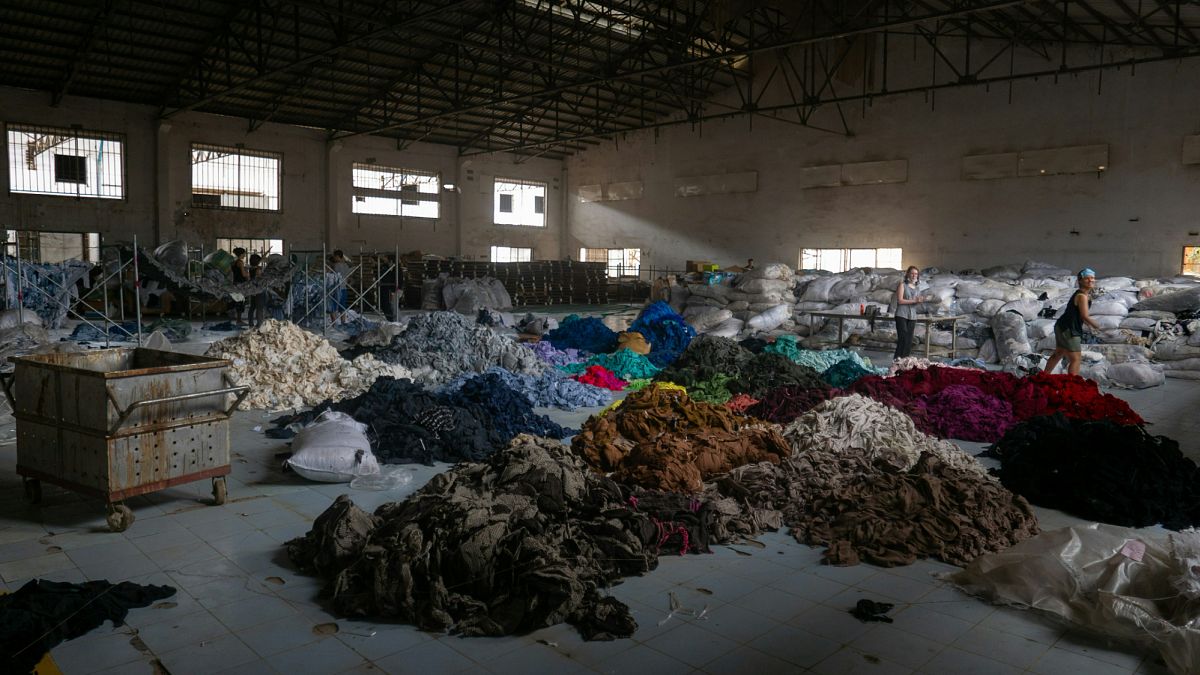Will Trump’s new tariff curb climate-damaging fast fashion?

Fast fashion is responsible for about 10 per cent of global carbon emissions – more than all international flights and maritime shipping combined.
A sweeping new US tariff on products made in China spells an uncertain future for fast fashion – but is this positive news for the climate?
The industry sees apparel and accessories that copy catwalk trends rapidly mass-produced and brought onto the market at a low cost.
The process causes significant damage to the environment. According to the UN Environment Programme, the fast fashion sector is the second-biggest consumer industry of water.
It is also responsible for about 10 per cent of global carbon emissions – more than all international flights and maritime shipping combined.
President Donald Trump’s tariff is expected to increase the prices American consumers pay for a wide array of products, including the ultra-cheap apparel sold on online shopping platforms, toys, and electronic devices such as computers and cellphones.
Fast fashion could become more expensive in the US
An additional 10 per cent tariff on all Chinese goods coming into the US took effect on Tuesday.
After failing to get a White House reprieve, China struck back with retaliatory tariffs on some US goods that are set to begin next week.
The sheer volume and variety of the China-made merchandise sold in the US means residents will probably see the prices of many typically inexpensive items tick higher if the tit-for-tat tariffs persist.
It will hit fast fashion particularly hard because Trump’s executive order also suspended a little-known trade exemption that allowed goods worth less than $800 (€772) to come into the US duty-free.
The trade rule, known as ‘de minimis’, meant low-cost garment producers could bypass taxes collected by customs authorities.
Shein and Temu have gained global popularity by offering a quickly updated assortment of ultra-inexpensive clothes, accessories, gifts and gadgets shipped mostly from China.
Under the changes effective Tuesday, these companies’ shipments from China will now be subject to existing duties plus the new 10 per cent tariff imposed by Trump, analysts said.
“The vast majority of these orders are valued less than $800 (€772), which means all or virtually all of them are going to get caught in that,” Youssef Squali, an analyst at Truist Financial, said.
Fast fashion is the world’s second-most polluting industry
The fast fashion industry causes considerable harm to the environment by pumping out massive greenhouse gas emissions and using vast amounts of water and energy.
Around 700 gallons (2,650 litres) of water are needed to produce one cotton shirt and 2,000 gallons (7,570 litres) for a pair of jeans, according to Business Insider.
Textile production is the world’s second most polluting industry responsible for approximately 1.2 billion tonnes of greenhouse gas emissions – a figure that’s higher than that of the entire European Union – scientists say.
By 2050 the fashion industry is predicted to use up to 25 per cent of the world’s carbon budget.
Textile dying is the world’s second-largest polluter of water as wastewater from the process is often discarded in streams and rivers.
Low-cost clothing is also driving a culture of throw-away fashion. According to the 2015 documentary The True Cost, the world consumes around 80 billion new pieces of clothing every year, 400 per cent more than 20 years ago.
Only 12 per cent of textile waste is recycled worldwide, according to the Ellen MacArthur Foundation. Even less – only 1 per cent – of castoff clothes are recycled into new garments; the majority is used for low-value items like insulation or mattress stuffing.
Will Trump’s tariff reduce the production of fast fashion?
Juozas Kaziukenas, founder of e-commerce intelligence firm Marketplace Pulse, said he thinks the price increases on platforms like Shein and Temu will be “pretty small” and the products they sell will remain cheap.
However, the rule change is likely to result in delivery delays since the packages now have to go through customs, Kaziukenas said.
Meg Pirie, from the policy think-tank Fashion Roundtable, is also doubtful that the tariff will have an impact.
“While Trump’s 10 per cent levy on goods made in China and sold to the US closes [the ‘de minimis’] loophole, fast-fashion brands are easily able to absorb these costs,” she says.
“Smaller brands will be hit harder, and may have to change a product’s structure and production process, by getting different components from different countries before assembling for example.”
In fact, she warns there may be a negative effect on the planet: “It’s dubious that these tariffs will help the environment as many will aim to pivot supply chains and therefore carbon footprints are increased.”
Lucy Tammam, creative director of sustainable clothing brand Tammam, is more hopeful.
“[The tariff] is not quite the “crap tax” we need but it does the same job – once these ultra fast, ultra cheap garments, that don’t last, and often aren’t even ever worn, cost a similar amount to a locally made, better quality garment, consumers are much more likely to choose the better option, or at the very least just opt to not buy anything at all,” she says.
“Shopping habits drastically need to change, with garments so cheap. For example, with a coat costing just a few dollars or pounds it is impossible that the people in that supply chain were fairly remunerated to make it. It has become a race to the bottom for the industry. Anything that means that price has to go up is a very good thing,” Tammam adds.
Pirie says she would also like to see long-term policies that support Extended Producer Responsibility – a policy that assigns producers responsibility for the full lifecycle of products – and tax incentives for sustainable brands.
This would promote environmental sustainability and support businesses and therefore jobs, she adds.
World News || Latest News || U.S. News
Source link



